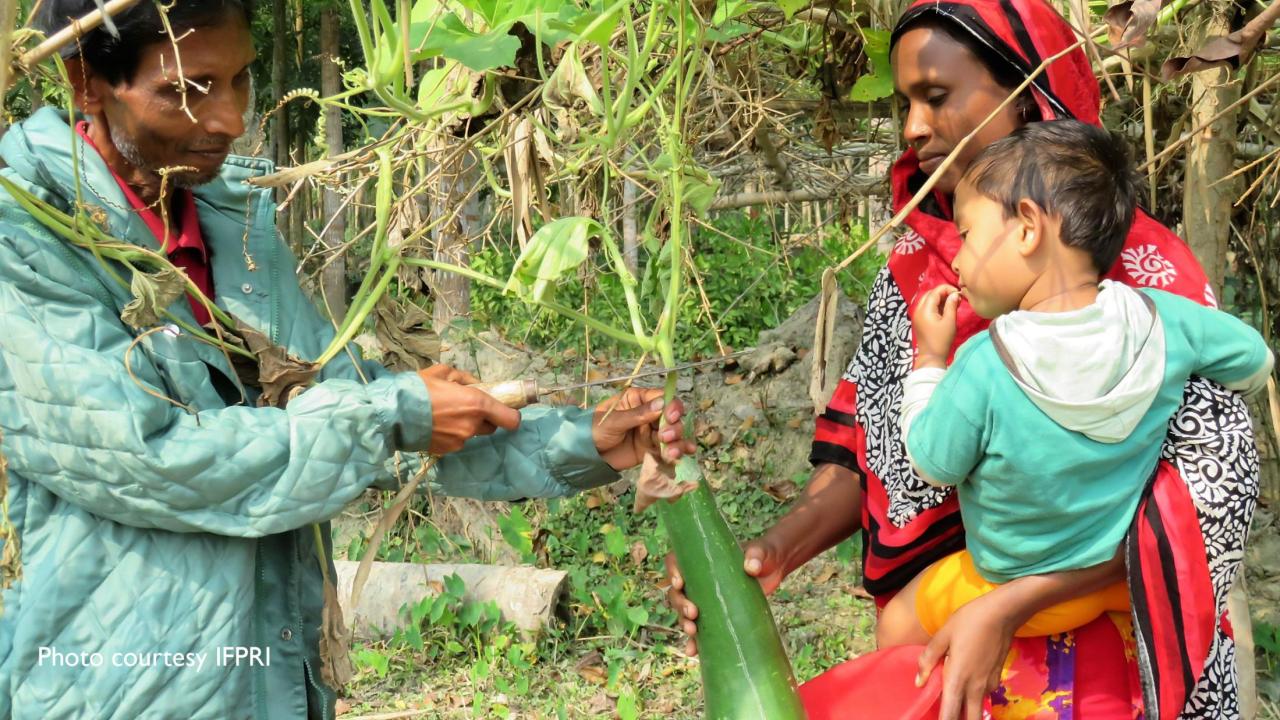
Resilience has become a major focus of development efforts worldwide but there remains a limited body of field-tested evidence to guide what types of programs can help agricultural families to achieve resilience.
MRR Innovation Lab researchers are returning to Bangladesh to evaluate whether the improvements generated by a three-year program to promote agricultural diversity, increase income, improve nutrition and empower women sustained after a devastating cyclone. This study will contribute to growing evidence on resilience while building on the initial program results to inform policies to build resilience to weather-related shocks.
Project overview
Lead Principal Investigator: John Hoddinott, Cornell University
Project Partners: International Food Policy Research Institute (IFPRI); Data Analysis and Technical Assistance Ltd, Bangladesh
Development Innovation: Women-focused agricultural and nutrition training programs
Commodity: Multiple
Targeted Population: Women and children
Country/Location: Bangladesh
Timeline: 2020-2024
Funding: $505,360 (USAID)
The Challenge
Agricultural development and women’s empowerment are powerful avenues for improving nutrition, particularly for women and children. However, even if these types of interventions are successful, there is a risk those gains will be lost in the next disaster. Is it possible to design interventions that strengthen livelihoods and improve wellbeing while also increasing families’ resilience?
The 2015-2018 Agriculture Nutrition and Gender Linkages (ANGeL) project in Bangladesh was designed to promote agricultural diversity, increase farm household income, improve nutrition and empower women. A 2015-2018 randomized control trial (RCT) led by the International Food Policy Research Institute (IFPRI) showed that with only the program’s training, most ANGeL households improved their agricultural production practices, their children’s diets and relationships in the home.
In May 2019, less than two years after ANGeL ended, Cyclone Fani struck northeast India and Bangladesh with heavy rain and widespread flooding. An estimated 13,000 houses nationwide were damaged and around 63,000 hectares of crops were affected in 35 districts. Four of the 16 districts included in the ANGeL study reported damage, primarily to cropland and housing.
In the midst of this tragedy, there is an opportunity to build evidence that can guide the development of programs that help families to become resilient to shocks like these. There is also the opportunity to test whether interventions like the ANGeL project, with its focus on children’s nutrition and women’s empowerment through training alone, have the potential to generate resilience.
Research Design
With MRR Innovation Lab support, the research team that designed, implemented and evaluated the ANGeL project will return to Bangladesh to re-survey participants and add evidence to three key knowledge gaps:
- Do the impacts of agricultural interventions like ANGeL persist after the intervention ends and truly facilitate resilient escapes from poverty?
- Do these types of interventions ensure that shocks like Cyclone Fani do not have long-lasting adverse development consequences?
- Do these interventions promote gender-sensitive resilience?
This extension of the original project will evaluate its lasting impact in four areas. The first is assets and their ownership by different members of the household. These assets include land and water, important for crop cultivation and aquaculture, as well as assets like tools, jewelry and housing. Income diversification is the second area of evaluation. The research team will assess diversification by the number of non-staple crops a family grows, both in field plots and homestead plots.
Diet diversity, the third area of focus, will be measured for women and children using the Food Consumption Score. The fourth area of focus is women’s empowerment, which in the ANGeL project was measured using the Abbreviated Women’s Empowerment in Agriculture Index (A-WEAI) and a later version of the WEAI developed for project-level use, pro-WEAI.
The research team will re-survey ANGeL project participants belonging to the following treatment arms as well as the control group:
- Training delivered to women and men on diversifying agricultural production
- Training on diversifying agricultural production plus nutrition training, both delivered to women and men
- Training on diversifying agricultural production plus nutrition training plus activities that improve the status/empowerment of women and gender parity, all delivered to women and men
- Control: Received none of these treatments
The final ANGeL project survey included 3,898 participants across all treatment arms out of a total of 4,000 original target households from across 16 districts in Bangladesh.[1]
Development Impact
This study will extend the impact of the original ANGeL project investments from the Government of Bangladesh, USAID, the Bill & Melinda Gates Foundation, the Consortium Research Program on Agriculture for Nutrition and Health (A4NH), Helen Keller International and IFPRI. It will also benefit from the careful design of the ANGeL project and detailed data collection on a wide range of household characteristics.
This study will build upon this knowledge base to assess whether ANGeL’s interventions may also inform the design of appropriate policies to address transient poverty by building resilience against shocks related to climate change. As climate change, food security and nutrition are interlinked, identifying policies and programs that address all three has intrinsic policy significance.
[1] Ahmed, A. et al. 2017. “Agriculture, Nutrition, and Gender Linkages (ANGeL) Baseline Study.” IFPRI.
